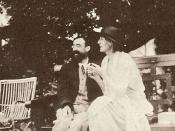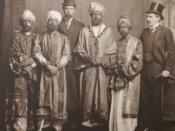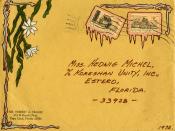MODERNISM SINGULAR PLURAL
Introduction
In Modernist Heresies: British Literary History, 1883-1924, Damon Franke scrupulously documents influence of Cambridge Heretics Society on literary and intellectual culture during late Victorian and early modernist period. Franke traces relationships among participants of this debate society and details its effects on intellectual culture, with the focus on its connections to other contemporary groups for intellectual exchange (notably Bloomsbury), and its influence, both direct and indirect, on the host of canonized modernist writers including T. S. Eliot, E. M. Forster, James Joyce, and Virginia Woolf. While Franke's scholarship achieves an admirable degree of empirical richness, anemic fashion in which he conceptualizes modernist aesthetics and historiography-conceptualizations that go largely unexamined from beginning of book to end-severely limits his ability to offer critical insight into history that he documents. [End Page 241]
Discussion
Franke begins Modernist Heresies with task of questioning traditional ways that scholars periodize and categorize twentieth-century literary history, focusing on tendency to make firm distinctions between late Victorians, Edwardians, and modernists, and arguing that tendency to periodize in this way begins with canonized modernists themselves.
Franke cites Virginia Woolf's claim in "Mr. Bennett and Mrs. Brown" that the radical epistemic break in December 1910 marks beginning of modern literature as an influential example of the modernist tendency to posit the historical rupture between Edwardian and modern periods. Against this "modernist elision of⦠antecedents" that does the "disservice to an understanding of fluid processes of history" (14), Franke posits "heretical discourses" characteristic of "synthetic character of Edwardian thought," which "provide the new historical perspective for understanding particular continuities and discontinuities of late Victorian and modernist literature and culture" (18). Focusing on effect of Cambridge Heretics Society in exposing numerous modernist writers, historians, philosophers, classicists, critics, and theologians to an Edwardian synthetic approach...


